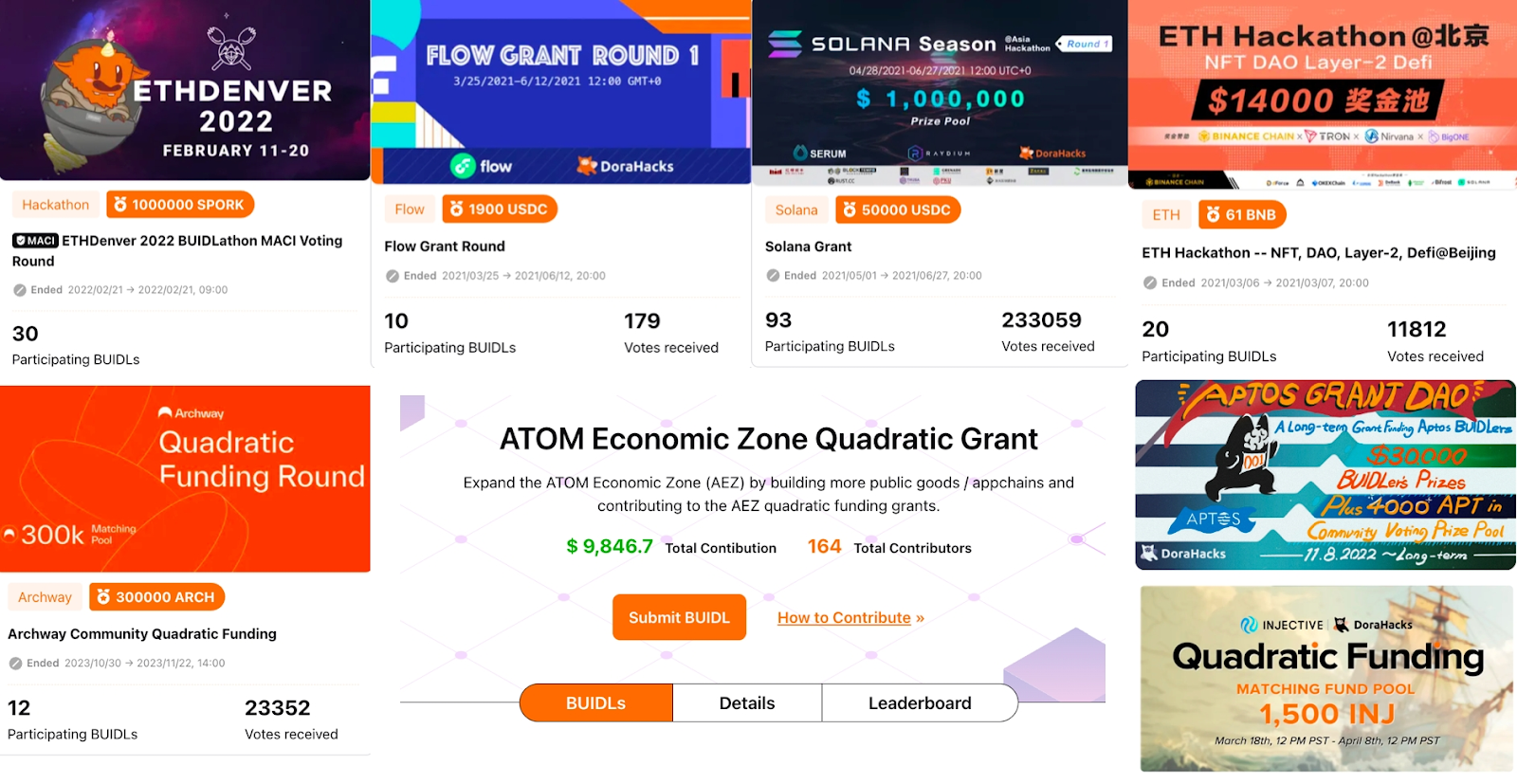DoraHacks, as the world's largest multi-chain developer incentive and hackathon platform, distributes millions monthly to numerous hackathon/grant winners. Effective governance is crucial in this process, especially when deciding who should be the recipients and how should the prize pools be shared.
Traditionally, prize pool is allocated either through expert judgements or community voting. However, the former can be disconnected from the community, reducing engagement, while the latter might devolve into a simple popularity contest, neglecting the project's quality and being extremely unfair for unknown, solo hackers.
Is there a method that reflects community will while still ensuring fairness? In its practice, DoraHacks turned to on-chain quadratic voting. This system allows voters to cast more than one vote, but the cost increases with each additional vote, similar to tiered electricity pricing. This means that if a project, albeit niche, holds significant importance to some community members, they can choose to invest more to increase the project's chances of winning.
One notable example was seen at the ETH Hackathon@Beijing in late 2020, where $14,000 was distributed using quadratic voting. This method considered not just the number of votes, but also the tokens used for voting, ensuring fair distribution and additional community donations. This example marked DoraHacks‘ first attempt at on-chain quadratic voting and application in an offline blockchain community event.
Since then, DoraHacks has promoted this voting method across various blockchain ecosystems, including Solana, Aptos, Cosmos Hub, Flow, to name a few. In 2022, at ETHDenver BUIDLathon, DoraHacks supported an unprecedented offline quadratic voting event and continued to expand global community participation in subsequent ETHDenver Online BUIDLathon. As the most supportive quadratic governance platform, DoraHacks has facilitated on-chain quadratic funding for 32 Web3 ecosystems, involving over 300,000 community members.
Quadratic governance has enabled extensive community engagement in ecosystem building and has provided crucial seed funding with market opportunities for early-stage public goods. To make quadratic voting more accessible, interesting, and effective to support quality projects, DoraHacks launched the "Community Incentive Fund." This initiative rewards active voting participants with Memecoins, such as Injective Quant ($QUNT) and Aptos Gui Inu ($GUI). Additionally, a device-independent quantum random number generator selects lucky voters to receive rare NFTs. Through this initiative, DoraHacks has made the quadratic governance process fun and engaging, showing a new direction for the development of public good funding.
Returning to the topic of on-chain governance, the blockchain world itself has numerous governance scenarios that urgently require more democratic and efficient voting methods. However, on-chain governance, like all systems, faces challenges - these challenges are partly due to the features of blockchains and partly due to chronic issues within democratic governance mechanisms. After extensive practices and exploration, DoraHacks has proposed comprehensive solutions, launching a new infrastructure for quadratic governance.
First, the challenges brought about by blockchain include the low cost of sybil attacks due to the ease of obtaining blockchain wallet addresses. DoraHacks has developed a proprietary anti-sybil attack algorithm that includes a 3-5 day checking period after each voting round. For votes detected as "sybil", although the funds they contributed are still considered direct donations to the projects, they would have their weights excluded from prize calculations.
Second challenge is the transparency of block activities, which, while beneficial for democracy, can also facilitate collusion. For instance, a project could guide uninformed community members to vote for it with promises of certain rewards or analyze real-time voting data to determine the most beneficial voting strategy. The best current solution to this problem is the "Minimal Anti-Collusion Infrastructure" (MACI), detailed in previous article:Pioneering Decentralized Governance: A Retrospective on DoraHacks' MACI/aMACI Study and Implementation
Additionally, democratic voting itself still faces many unresolved issues, notably a new form of "winner-takes-all" scenario. Even with mechanisms like quadratic voting that suppress "tyranny of the majority," extreme scenarios can arise where one project wins an overwhelming majority of funding, overshadowing smaller projects. To address this, DoraHacks introduced the on-chain "Progressive Tax" mechanism, which significantly improves the fairness and effectiveness of funding distribution by ensuring that the top-funded project can only receive a certain multiple more than the least-funded project.
In conclusion, quadratic governance offers a new option for multi-chain governance models. DoraHacks' practices demonstrate that mechanisms like on-chain quadratic voting and MACI can effectively balance interests, ensuring diversity and representation for small teams even in complex governance scenarios. These explorations not only pursue technological and governance innovation but also pave the way for the future of the blockchain: a more democratic, transparent, and inclusive decentralized ecosystem.
Reference:
Quadratic Governance: What’s Working and What’s Not?
How do hash-based post-quantum digital signatures work? (Part 1)
How do hash-based post-quantum digital signatures work? (Part 2)
